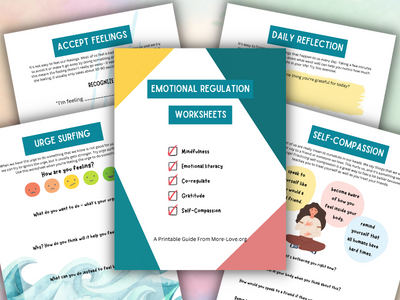
One of the biggest challenges parents face in supporting their children with eating disorders like binge eating disorder, bulimia, orthorexia and anorexia, is the blame, guilt and shame they feel about how their child’s illness reflects upon them as parents.
As parents, we carry natural burdens when it comes to our children’s success and happiness in life. Our sense of burden can overtake us and negatively impact our ability to be the parents our children need. Of course, we want our children to succeed and be happy, but to place all of the responsibility of their future life in our hands is to ignore the fact that our children are their own people, and we are not their only influence in their lives.
Emotional Regulation Worksheets
Give these printable worksheets to grow more confident, calm and resilient and feel better, fast!
- Self-Esteem
- Self-Regulation
- Mindfulness
- Calming strategies
To shoulder the blame for your child’s eating disorder is to assume that you alone control your child’s path in life. You don’t. You never have, and you never will. Your child is her/his own person. You cannot be blamed for anything s/he does or does not do. Seriously. None of us can control another human being.
Eating disorders are complex mental disorders with multiple interlinked causes. While it’s easy to assign blame to the child, the family, and our diet-obsessed culture, there is no single answer for why any person develops an eating disorder.
If you are carrying around blame associated with your child’s eating disorder, then you need to be gentle with yourself and work at unraveling your guilt and shame so that you can move forward as the parent they need right now.
I feel guilty about my child’s eating disorder
If you are thinking things like “I talked to her about achieving a healthy weight, and now she’s anorexic!” or “I always took her out for ice cream when she was sad, and now she is bulimic.” Sure, you can accept your guilty thoughts. You have made mistakes (all parents do!), but none of your mistakes could possibly single-handedly cause an eating disorder.
We all make mistakes. Look carefully at every guilty thought you have around your child’s eating disorder, acknowledge it, and then release it. We all do the very best we can, and what matters is what you do now that you know you have an eating disorder in the house.
I am ashamed of myself
Shame takes guilt to a deeper level. When you feel shame, you have a sense that you are deeply and inherently flawed as a parent. This means that those normal guilty thoughts turn ugly and against you as a person. When we feel shame, we believe that we are bad at our core. We believe that we are worthless and unlovable. Worst of all, shame also gives us the belief that there is nothing we can do to change our toxic selves.
And this is the problem with shame when we are parenting. Someone in deep shame cannot see any way to repair the mistakes they have made or improve the lives of those around them by learning new skills and behaviors. Shame is so debilitating and painful, that parents living in shame develop coping mechanisms such as avoiding deep contact with their children or even turning the blame upon their children to avoid the sense of failure they feel within themselves.
Shame is the worst possible feeling to live with, except, perhaps, the experience of living with a parent who feels ashamed. That’s right. As a parent who loves a child, you must find a way out of shame in order to help your child heal from an eating disorder. This is not simple or easy, but it is critical.
If you are feeling guilt and/or shame about your child’s eating disorder, then please find a trusted friend or, ideally, a licensed therapist, who can work through these issues with you and lessen the burden you are carrying. Even a few sessions with a therapist can make a huge impact on your ability to free yourself from guilt and shame, and move forward more powerfully as your child undergoes treatment for an eating disorder.

Ginny Jones is the founder of More-Love.org, and a Parent Coach who helps parents who have kids with disordered eating and eating disorders. Combining science, compassion, and experience coaching hundreds of families, she helps parents understand what’s going on with their kids’ eating behaviors and teaches them the science-backed skills to heal kids’ relationship with food, improve their body image, and feel better about themselves, their relationships, and life in general.
Ginny has been researching and writing about eating disorders since 2016. She incorporates the principles of neurobiology and attachment parenting with a non-diet, Health At Every Size® approach to health and recovery.


